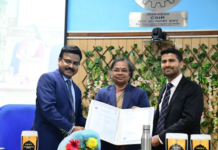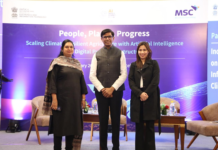
Climate change is putting coffee-growing areas under pressure. Smallholder coffee farmers are exposed to the risk of irregular weather conditions that can affect their crops.
On International Coffee Day, Nestlé announced that it is piloting a weather insurance program in Indonesia for more than 800 smallholder coffee farmers that supply coffee to its brand Nescafé. The company is launching the insurance scheme in collaboration with Blue Marble, a specialist in climate insurance. The insurance provides financial protection to help farmers cope with unpredictable weather patterns of rainfall and severe drought.
Marcelo Burity, Global head of Nestlé’s Green Coffee Development, said, “This weather insurance helps to establish a support mechanism for smallholder coffee farmers in Indonesia. It allows them to access financial resources to re-establish their crops in the event of irregular weather conditions while building resilience in coffee farms.”
The insurance uses satellite-based climate data to determine when coffee output has been impacted by either too much or not enough rainfall during key phases of the crop cycle. Payments are issued automatically to registered coffee farmers that have been affected, according to the severity of the weather.
“Smallholder coffee farmers in Indonesia are vulnerable to climate risks and need access to insurance to protect against extreme weather events,” said Jaime de Piniés, CEO of Blue Marble. “We are proud to partner with Nestlé and its brand Nescafé to develop innovative ways to support the climate adaptation of smallholder coffee farmers and their families.”
This initiative is an integral part of the Nescafé Plan 2030, the brand’s vision to support the long term sustainability of coffee and to help improve farmers’ livelihoods. Based on the results of the pilot, Nestlé will determine whether to expand the approach to other Nescafé sourcing locations around the world.
Sharing knowledge
Changing agricultural practices requires access to knowledge and time to learn and implement. By moving to regenerative agriculture, coffee farmers can help restore soil health, reverse biodiversity loss, and strengthen ecosystems. Doing so also helps reduce the amount of greenhouse gases released into the atmosphere.
Nestlé, has contributed to the ‘Regenerative Agriculture for Low-Carbon and Resilient Coffee Farms – A Practical Guidebook,’ developed by the Alliance of Bioversity International and the International Center for Tropical Agriculture (CIAT). This guidebook provides field agronomists, trainers and professionals working with coffee farmers with a set of best practices that they can use and adapt to different farming contexts, helping farmers transition to regenerative agriculture.
These best practices include agroforestry, intercropping, soil conservation and cover crops, integrated weed and pest management, integrated nutrient management, efficient water use, waste valorization, landscape actions and the rejuvenation of coffee trees with well adapted varieties.
Pascal Chapot, Global head of Sustainable Agriculture Development at Nestlé, said, “The guidebook gives coffee farmers a set of field actions they can implement tomorrow to help them become more resilient to climate change and to diversify their sources of income. Knowledge is key, and we hope that this guidebook makes these regenerative agriculture practices more accessible to farmers and supports an accelerated transition towards them. This is essential to tackling the climate challenges ahead.”
Mirjam Pulleman, senior soil ecologist and co-author of the guidebook said, “Creating real impact on the ground requires learning from real experiences with farmers in different origins and providing incentives to support farmers in their journey. The best practices highlighted in the guidebook are a starting point. Each practice will need to be tailored to the specificities of each country of origin, the different farm types, the surrounding landscapes and the resources available.”
IndiFoodBev — authentic, impactful and influential
An English-language food and beverage processing and packaging industry B2B platform in print and web, IndiFoodBev is in its third year of publication. It is said that the Indian food and beverage industries represent approximately US$ 900 billion in revenues which implies more than 20% of the country’s GDP. Eliminating the wastage on the farmside can help to deliver more protein to a higher number of the population apart from generating sizable exports. The savings in soil, seeds, water, fertilizer, energy and ultimately food and nutrition could be the most immense contribution that country is poised to make to the moderation of climate change.
To improve your marketing and grow sales to the food and beverage processing and packaging industry, talk to us. Our research and consulting company IppStar [www.ippstar.org] can assess your potential and addressable markets in light of the competition. We can discuss marketing, communication, and sales strategies for market entry and growth.
Suppliers and service providers with a strategy and budget for targeted marketing can discuss using our hybrid print, web, video, and social media channels to create brand recognition linked to market relevance. Our technical writers are ready to meet you and your customers for content.
The second largest producer of fruit and vegetables in the world is continuously expanding processing capacities and delivery systems with appropriate innovative technologies. We cover product and consumer trends, nutrition, processing, research, equipment and packaging from farm to thali. Get our 2025 media kit and recalibrate your role in this dynamic market. Enhance your visibility and relevance to existing markets and turn potential customers into conversations. Ask for a sample copy of our bi-monthly in print or our weekly IndiFoodBev eZine each Wednesday.
For editorial info@ippgroup.in — for advertisement ads1@ippgroup.in and for subscriptions subscription@ippgroup.in
Naresh Khanna – 10 February 2025
Subscribe Now










